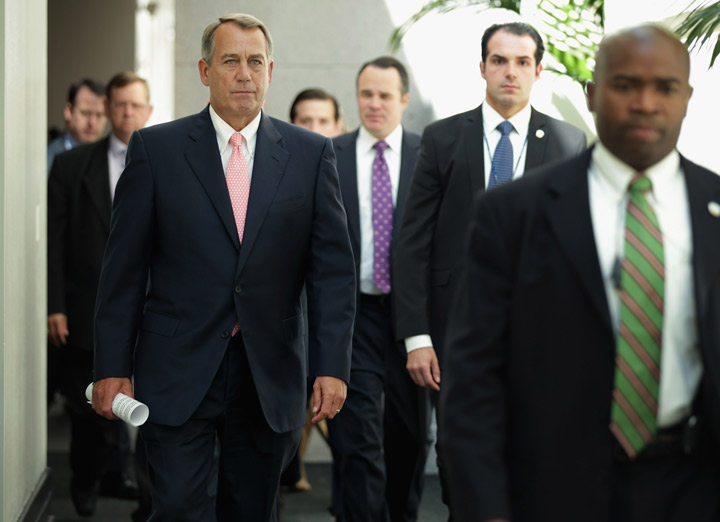WASHINGTON – President Barack Obama ramped up pressure on Republicans Monday to avoid a post-midnight government shutdown, saying that failure to pass a short-term spending measure to keep agencies operating would “throw a wrench into the gears” of a recovering economy.

Late Monday, Obama called Republican and Democratic congressional leaders but there was no breakthrough in the budget impasse.
Earlier, Obama urged House Republicans to pass a short-term spending bill free of any conditions that would weaken the nation’s 3-year-old health care law.
Obama spoke as the House and Senate traded measures, with the Republican-led House seeking to delay implementation of the health care law and the Democratic Senate insisting on an unencumbered short-term spending bill.
Obama did embrace one GOP measure Monday, signing legislation that would ensure that members of the armed forces would continue to get paid during any shutdown. The House had passed the legislation over the weekend and the Senate approved it Monday.
House Speaker John Boehner, R-Ohio, has been under pressure from conservatives to use the stopgap spending bill and subsequent legislation that would raise the nation’s borrowing authority as leverage to delay or cut federal finances to the health care law as a way of stopping it in its tracks. The health care law is entering a crucial new stage on Tuesday when people begin to sign up for the insurance marketplaces set up under the law to help the uninsured.
“One faction of one party in one house of Congress in one branch of government doesn’t get to shut down the entire government just to refight the results of an election,” Obama said, responding to House manoeuvres in the White House briefing room.
The spending fight is a prelude to the bigger confrontation over the nation’s credit limit, expected to hit its $16.7 trillion cap in mid-October. Obama on Monday urged Republicans not to saddle the legislation to increase the debt ceiling with measures designed to undermine the health care law. He has vowed not to negotiate over the debt ceiling, noting that a default would be worse for the economy than a partial government shutdown.
On Wednesday, Obama is scheduled to meet with top Wall Street CEOs to discuss the state of the economy, including the debt ceiling. The meeting is with members of the Financial Services Forum, a trade group representing the 19 biggest financial service institutions doing business in the United States, including Goldman Sachs, Bank of America and Citigroup. The Forum joined 250 other business organizations in a letter to Congress on Monday calling on them to avoid a shutdown, raise the debt ceiling and then address long-term spending issues and deficits.
Monday evening, Obama called Boehner, House Minority Leader Nancy Pelosi, D-Calif., Senate Majority Leader Harry Reid, D-Nev., and Senate Minority Leader Mitch McConnell, R-Ky.
The call with Boehner lasted nearly 10 minutes. Boehner spokesman Brendan Buck said Boehner told Obama that the health care law was costing jobs.
Impact
The impact of a shutdown would be felt unevenly.
Many low-to-moderate-income borrowers and first-time homebuyers seeking government-backed mortgages could face delays, and Obama said veterans’ centres would be closed.
About 800,000 federal workers, many already reeling from the effect of automatic budget cuts, would be ordered to report to work Tuesday for about four hours – but only to carry out shutdown-related chores such as changing office voicemail messages and completing time cards.
Some critical services such as patrolling the borders and inspecting meat would continue. Social Security benefits would be sent, and the Medicare and Medicaid health care programs for the elderly and poor would continue to pay doctors and hospitals.
U.S. troops were shielded from any damage to their wallets when the Senate approved legislation assuring the military would be paid in the in the event of a shutdown. The House passed the bill early Sunday morning.
That had no impact on those who labour at other agencies.
“I know some other employees, if you don’t have money saved, it’s going to be difficult,” said Thelma Manley, who has spent seven years as a staff assistant with the Internal Revenue Service during a 30-year career in government.
As for herself, she said, “I’m a Christian, I trust in God wholeheartedly and my needs will be met.” She added, “I do have savings, so I can go to the reserve, so to speak.”
The last time the government shut down, in 1996, Republicans suffered significant political damage, and then-President Bill Clinton’s political fortunes were revived in the process.
Now, as then, Republicans control the House, and senior lawmakers insist even a shutdown isn’t likely to threaten their majority in the 2014 elections. “We may even gain seats,” Oregon Rep. Greg Walden, who chairs the party campaign committee, said recently.
For all the controversy about other matters, the legislation in question is a spending bill – and there was little if any disagreement about the spending-related issues.
The House and Senate have agreed to fix spending for a wide swath of federal programs at an annual level of $986 billion for the budget year that begins Oct. 1, the same as for the 12 months just ending.
Without separate legislation to make further reductions, across-the-board cuts would automatically take effect early next year that would reduce the level to $967 billion.
Associated Press writers Alan Fram, Andrew Taylor, Laurie Kellman, Pauline Jelinek; Henry Jackson, Donna Cassata and Stacy A. Anderson in Washington and Marc Levy in Harrisburg, Pa., contributed to this report.

Comments